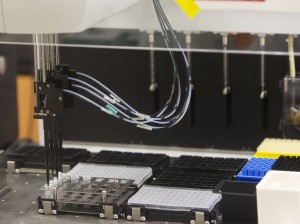DNA flaw boosts cancer risk from diabetes—study

In this Friday, March 2, 2012, file photo, DNA samples are processed at the New York State Police Forensic Investigation Center in Albany, New York. A DNA flaw may explain why people with Type 2 diabetes are more prone to blood cancers than the rest of the population, a study said Sunday, July 14, 2013. AP PHOTO/MIKE GROLL
PARIS—A DNA flaw may explain why people with Type 2 diabetes are more prone to blood cancers than the rest of the population, a study said Sunday.
Doctors have long known that Type 2 diabetes is associated with leukemia and lymphoma, but the reasons for this have been unclear.
Researchers in France and Britain, looking at blood samples from nearly 7,500 people, including 2,200 patients with Type 2 diabetes, suggest the answer lies in cellular mutations called clonal mosaic events (CMEs).
These are defects that result in some cells having extra copies—or, alternatively, missing copies—of large stretches of genetic code.
Reporting in the journal Nature Genetics, the researchers said that in the general population, CMEs are usually very rare in young people but become more common with aging.
Among people aged over 70, around two percent have these mutations, which gives them a tenfold higher risk of developing blood cancer, previous research has found.
But among people with Type 2 diabetes, CMEs were four times more common than otherwise healthy people, the new study found. They also had a far higher rate of kidney failure, eye disease or heart disease.
“Type 2 diabetes is a disease that accelerates aging, so we wondered if it would make people more likely to have these genetic defects that are associated with aging,” Philippe Froguel, from the School of Public Health at Imperial College London, who led the study, said.
“This finding may partly explain why people with Type 2 diabetes are more likely to get blood cancers.”
Froguel, who worked with counterparts from France’s National Centerfor Scientific Research (CNRS), said that, in the future, a genetic test could help identify patients with Type 2 diabetes who are likelier to develop CMEs.
“These patients would be followed up closely to watch for early signs of leukemia and could start having mild chemotherapy,” he said in a press release.
According to the UN’s World Health Organization (WHO), 347 million people around the world have diabetes, a disease in which the body fails to break down glucose in the blood through the hormone insulin.
Ninety percent of these have the Type 2 form of the disease, which typically shows up in adulthood or late childhood, driven by obesity and a sedentary lifestyle.














